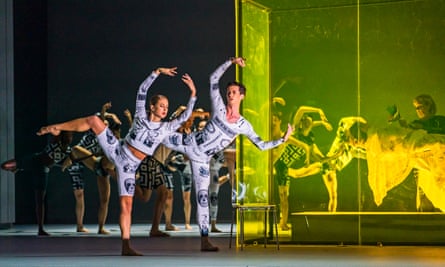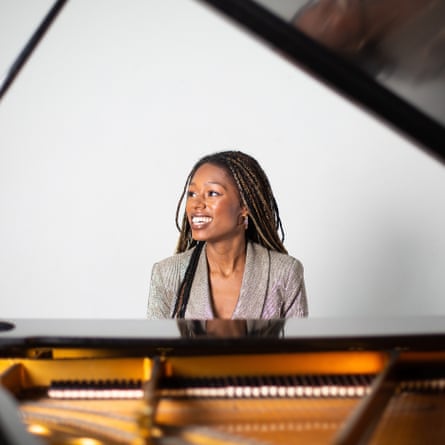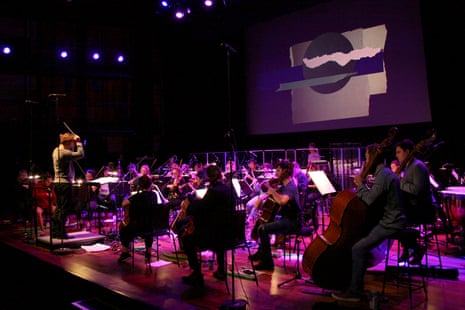Taking a walk around a Derby retail park at 4am seems an unlikely way to find inspiration, but then composer Anna Meredith is anything but conventional. Her work defies categorisation, dipping into the worlds of contemporary classical music, art pop, electronica, jazz and experimental rock, which makes her a perfect candidate for Radio 3’s Unclassified show, where all those genres meet and mingle, opening ears to new possibilities and expanding inquiring minds.
The South Bank played host to the first Unclassified Live last week, where the programme’s presenter, Elizabeth Alker, introduced a near-capacity audience to several works that would defeat even the most determined pigeonholer. For those of us used to seeing rather too many grey-haired concert-goers, it was gratifying to find hordes of younger, enthusiastic people turning out to hear music that would challenge, excite and intrigue them.
Derby’s retail park featured in Meredith’s atmospheric Four Tributes to 4am, a piece she wrote when composer-in-residence for Sinfonia Viva, based in the city. She explored what she called “the crossover point between yesterday and tomorrow, at the deadest part of night” by recording the sounds of this no man’s land time to incorporate into her music. Southbank Sinfonia’s growling trombones set the scene, singing a menacing chorale underneath a unison string melody that grew and blossomed with burgeoning woodwind, percussion and electronics as we were taken around sleepy suburban streets, saw clubbers teetering home, stood depressed in front of a monolithic, grey shopping warehouse (plodding, mesmeric music here) and heard the first traffic of the day swoosh past. The energy in the music (yes, even at 4am) found expression in beautifully kaleidoscopic visuals by Ewan Jones Morris and Colette Vermeulen. They made a harmonious backdrop to a hugely rewarding piece.
Nicole Lizée is a Canadian composer and film-maker who combines a delicious sense of humour with a taste for the surreal. Her piece 8-Bit Noir combined an edgy, imaginatively orchestrated score with a crazy documentary-style film where malevolent, early computer technology turned a printed viola duet into unintelligible, blocky graphics, rhythm into Lego bricks and filled a singer’s voice with ugly static. The film was so daftly enthralling that it threatened to overwhelm the nervous, agitated score, deftly controlled by conductor André de Ridder and his players, who were often required to rip up sheets of paper in strict tempo (George Osborne’s Evening Standard proving the most sonorous). You can hear how this works on radio when the evening is broadcast on 17 October, including three less impressive pieces from the experimental duo Darkstar.
Another part of the musical firmament that likes to work across boundaries is English National Opera, this time inviting Royal Ballet choreographer Wayne McGregor to direct Gluck’s Orpheus and Eurydice, the first in a series of four operas exploring the Orpheus myth. It seemed like an inspired choice. McGregor is a great communicator, creating accessible ballet that speaks directly to us of love and loss, toil and torment, much in the way that Gluck wished to do when moving music away from the formalities of the baroque towards a more sensual classical aesthetic. But the dance dominates, rather than complements, the piece.

Only a few minutes in, we realise the excellent chorus has been consigned to its own Hades in the orchestra pit, where they won’t get in the way. Similarly, Lizzie Clachan’s set is a mere runway for dancers, almost devoid of features, bar a huge screen that spits and sputters as a backdrop for Orpheus’s descent into the underworld.
With only three principal singers, McGregor fills this cavernous space with his company of 14 handpicked dancers, who deftly reflect on the action as a second mute chorus, mirroring first the despair of Orpheus at the death of his wife Eurydice, then representing the Furies of the underworld and later, in the most serene moment of the evening, the blessed spirits that dance to Gluck’s most famous tune. It’s often arresting, particularly as Louise Gray dresses them in a series of contrasting colour palettes, from drab to fluorescent yellow and red.
But when the dancing stops, so too does the direction. On an empty stage, Alice Coote as Orpheus (on first night stricken with illness, but bravely carrying on) and Sarah Tynan as sweet-voiced Eurydice, seemed left to wander. Where was the climb out of Hades? And why, when the central premise of the plot is that Orpheus must not look back at Eurydice, did Coote keep glancing over her shoulder?
Soprano Soraya Mafi makes a winning character as Love, bringing hope to despairing Orpheus, and Harry Bicket conducts the Berlioz version of the score with his usual insouciance, but this was, perhaps inevitably, a restrained start to the season. How much better it might have been to open with Offenbach’s vibrant take on the story, but that comes next.

Nottingham’s Kanneh-Mason family – seven super-talented siblings – have been in the news again recently as bright products of music education in the state system. Their mother was quoted as saying that unless provision is strengthened in schools “there will not be another Sheku Kanneh-Mason”, which is certainly true. And the same could be said for the star cellist’s older sister, Isata Kanneh-Mason, who is busy establishing herself as a pianist of considerable stature.
She caused a stir with her debut recording this summer, and repeated that excitement at Kings Place last week, playing the music of her idol Clara Schumann with real emotional intelligence, particularly the Sonata in G minor. And in Three Romances for Violin and Piano, Op 22, Kanneh-Mason showed an instinctive sensitivity towards violinist Ellinor D’Melon; probably the fruit of years at home accompanying all those younger brothers and sisters. They’ll have a lot to thank her for in years to come.
Star ratings (out of five)
Unclassified Live ★★★★
Orpheus and Eurydice ★★★
Isata Kanneh-Mason ★★★★
Orpheus and Eurydice is at the Coliseum, London, until 19 November

Comments (…)
Sign in or create your Guardian account to join the discussion